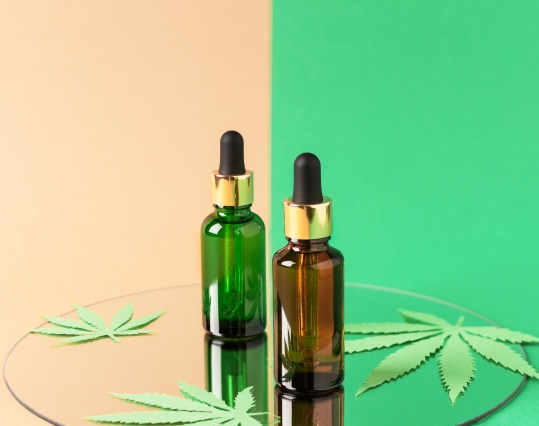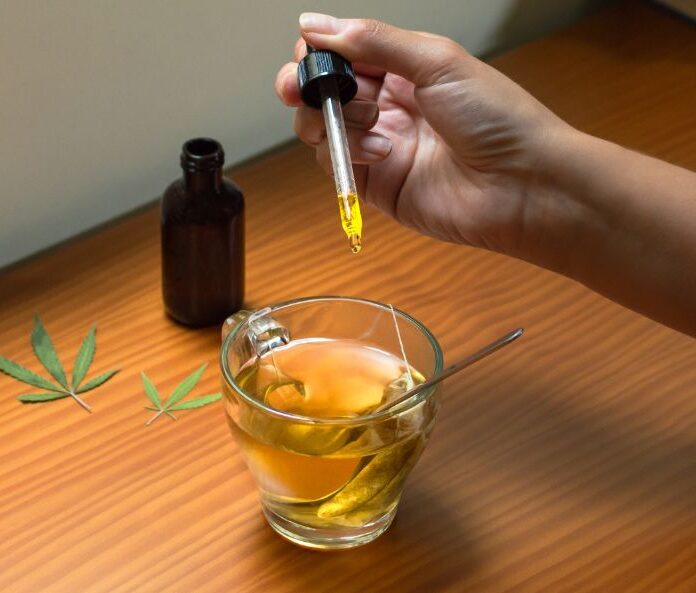Are you curious about the potential benefits of CBD products but concerned about the possible adverse effects? It’s important to be well-informed and prepared as you navigate the world of CBD.
In this guide, we will explore the various side effects of CBD and provide you with the knowledge and strategies to effectively manage them. By understanding the factors that influence side effects and learning how to minimise and address any adverse reactions, you can confidently incorporate CBD into your wellness routine.
Let’s explore the fascinating realm of CBD and discover how to maximise its benefits while ensuring your well-being. If you’re also looking for high-quality CBD to incorporate into your wellness routine, browse our online store for vapes, CBD oil, edibles, concentrates, and more.
CBD and how it works
CBD, or Cannabidiol, is a natural compound and active ingredient derived from the cannabis plant, usually extracted with CO2. It is thought to work by interacting with the endocannabinoid system in the human body to promote balance and overall well-being. The endocannabinoid system is a complex network of receptors and neurotransmitters that play a crucial role in regulating various physiological processes. When CBD is consumed, it binds to these receptors, influencing the release of certain neurotransmitters and promoting a state of equilibrium.
One of CBD’s most well-known health benefits is its potential to alleviate chronic pain. Clinical trials have shown that CBD can help reduce pain associated with conditions such as arthritis. By targeting the endocannabinoid system, CBD can possibly modulate pain perception and reduce inflammation, providing relief to those suffering from chronic pain.
In addition to its pain-relieving properties, CBD has been studied for its potential to treat various other health conditions, and CBD is used by many people to help relieve the symptoms of anxiety disorders, stress, and sleep disorders. However, it’s important to note that more research is needed to fully understand how CBD affects these conditions.
While CBD is generally considered safe, it isn’t without potential adverse effects. It’s essential that you consult with a doctor before incorporating CBD into your routine, especially if you take certain medications that CBD may interact with and possibly make less effective.
Common side effects of CBD
Some individuals may experience common side effects when using CBD. While CBD is generally well-tolerated, it’s important to be aware of the potential risks and adverse effects that may occur.
Common side effects are usually mild and temporary and include:
- Dry mouth: Often referred to as “cottonmouth,” CBD can reduce saliva production, leading to a dry or sticky feeling in the mouth.
- Drowsiness: Some people may experience sleepiness or drowsiness, especially with higher doses. This can be beneficial for users taking CBD for sleep issues but problematic during the day or when concentration is required.
- Changes in appetite: CBD might increase or decrease appetite, leading to weight gain or loss in some cases.
- Diarrhoea: High doses of CBD may upset the stomach, leading to diarrhoea or general digestive discomfort for some individuals.
- Nausea: Although less common, some individuals may experience nausea, especially when starting CBD or taking higher doses.
- Fatigue: CBD can cause feelings of tiredness or fatigue, which, similar to drowsiness, can be beneficial or undesirable depending on the individual’s needs.
- Irritability or mood changes: In some cases, CBD might lead to irritability or minor mood changes.
- Low blood pressure: CBD, when taken in high doses, can result in a drop in blood pressure, which can make you feel light-headed. This would typically occur within a few minutes.
- Dry eyes: Similar to dry mouth, some users may experience dryness in the eyes, which can lead to discomfort or a sensation of grittiness.
- Interaction with other medications: CBD can interact with other medications, potentially increasing or decreasing their effects. This isn’t a side effect of CBD alone but a consideration for those taking other treatments.
While most people tolerate CBD well and do not experience severe side effects, it’s crucial to start with a low dose and observe how your body reacts. Consultation with a healthcare provider is particularly important for those with pre-existing health conditions or those taking other medications.
Factors influencing CBD side effects
Factors that can influence the side effects of CBD include individual sensitivity, dosage, and method of consumption. Understanding these factors can help in navigating the potential adverse effects effectively.
Individual sensitivity
This plays a significant role in determining how someone will respond to CBD. While many people experience minimal side effects, some may be more sensitive and experience more pronounced effects. Since this can vary from person to person, it’s essential to start with a low dosage and gradually increase it to assess your own sensitivity.
Dosage
The amount of CBD you consume can influence the side effects you may experience. Taking a higher dose may increase the likelihood of experiencing adverse effects. It’s recommended to follow the dosing instructions provided by the manufacturer and consult with a healthcare professional for personalised advice.
The method of consumption
Different delivery methods can have varying effects on the body. When CBD is inhaled, it enters the bloodstream quickly through the lungs, providing rapid effects. This method may lead to side effects like irritation of the lungs or throat, especially in sensitive individuals or those with respiratory issues. However, controlling and stopping use is easier if adverse effects are noticed because it acts quickly.
Consuming CBD orally involves passing through the digestive system and liver before entering the bloodstream, which can delay the onset of effects and reduce bioavailability. This method might lead to gastrointestinal side effects such as nausea or discomfort, especially with larger doses. However, it’s often preferred for its ease of use and the ability to provide a slow, steady release of CBD.
Taking CBD sublingually involves placing it under the tongue for absorption directly into the bloodstream. This method bypasses the digestive system, leading to quicker effects than ingestion. It may be associated with local irritation or taste discomfort but typically has fewer systemic side effects compared to inhalation or oral ingestion.
CBD, applied topically, is generally used for localised relief of pain or skin conditions. Since it does not enter the systemic circulation in significant amounts, it usually has minimal side effects. However, some might experience skin irritation or allergic reactions to the product’s ingredients.
Minimising and managing side effects
To minimise and manage potential side effects, it’s important to take certain precautions and make informed decisions when using CBD.
While CBD is generally well-tolerated, some individuals may experience side effects. To reduce the likelihood of experiencing these side effects, starting with a low dosage and gradually increasing it over time is recommended. This allows your body to adjust to CBD’s effects.
It is also essential to buy CBD items from trusted, reputable retailers to help ensure you are getting the purity and potency as advertised. Reading product labels and understanding the extraction methods used can help you make informed decisions.
You should also consult with a healthcare professional, especially if you are taking medications that may interact with CBD or you have a pre-existing medical condition.

Long-term use and side effects
Long-term use of CBD has been associated with a few potential side effects that are important to be aware of:
Adverse reactions: Some individuals may experience adverse reactions such as dry mouth, drowsiness, or changes in appetite. These side effects are usually mild and temporary, but monitoring your body’s response to CBD is important.
Liver injury: There have been rare cases of liver injury associated with the long-term use of CBD. This risk is higher in individuals who’ve pre-existing liver conditions or are taking medications that are metabolised by the liver. Regular liver function tests may be recommended for those who use CBD on a long-term basis.
Interactions with drugs: It’s important to be aware that CBD can interact with certain medications, which can lead to their effectiveness being reduced or to increasing the risk of side effects. It’s crucial to inform your healthcare provider about your CBD use to avoid any potential drug interactions.
Tolerance: With long-term use, some individuals may develop a tolerance to CBD’s effects. This means that higher doses may be needed to achieve the same desired effects. It’s important to monitor your use of CBD and adjust the dosage as needed.
Remember that choosing products from reputable sources is important, and checking for third-party lab testing is also important to ensure product safety and quality.
When to seek medical advice
Here are some instances when it’s advisable to consult a medical professional:
Severe allergic reactions: If you develop symptoms such as difficulty breathing, swelling of the face or throat, or hives, it could indicate an allergic reaction to CBD. Seek immediate medical attention.
Worsening of existing medical conditions: If you notice that your pre-existing medical conditions worsen after starting CBD, consult with your doctor. They can evaluate whether CBD is interacting with your medications or exacerbating your symptoms.
Unusual changes in mood or behaviour: CBD may affect your mental health, and if you experience sudden shifts in mood, increased anxiety, or depression, it’s important to seek medical advice.
Persistent digestive issues: While CBD can help with gastrointestinal discomfort, if you experience persistent stomach pain, nausea, or diarrhoea, consult a healthcare professional.
Unexpected changes in medication efficacy: If you notice that your prescribed medications aren’t working as effectively as before, it’s essential to discuss this with your doctor. They can assess if CBD impacts your medications’ absorption or metabolism.
Special considerations and precautions
Be aware of the differences between full-spectrum, broad-spectrum, and isolate CBD products. Full-spectrum products contain a range of cannabinoids and terpenes, including trace amounts of THC. Broad-spectrum products are similar but typically THC-free. CBD isolate is pure CBD without other cannabinoids or terpenes. Your choice may depend on personal preference, legal considerations, and sensitivity to other cannabis compounds.
You should also familiarise yourself with the legal status of CBD in your area. While CBD is legal in many places, laws can vary significantly by region and often depend on the source of the CBD (hemp vs. marijuana) and the levels of THC in the product.
It’s important to note that if you are pregnant or breastfeeding, then you should avoid using CBD unless under the guidance of a healthcare provider. The effects of CBD on foetal development and nursing infants are not well understood and could pose risks.
Additionally, if you have allergies or sensitivities, carefully review the ingredients list of any CBD product you consider using, as some may contain allergens or additives.
Responsible CBD use
To ensure a safe and responsible experience with CBD, it’s crucial to understand proper usage guidelines and take necessary precautions. As stated, CBD side effects can vary from person to person, so it’s important to start with a low dose and gradually increase as needed. It’s also advisable to consult with a healthcare professional before incorporating CBD into your routine, especially if you’re currently taking any medications or dietary supplements.
When using CBD, always follow the dosing instructions provided by the manufacturer. Pay attention to any specific guidelines for the product you’re using, such as whether it should be taken with food or on an empty stomach. This will help maximise the benefits and minimise the risk of side effects.
Additionally, it’s important to be aware of any potential interactions between CBD and other medications you may be taking. CBD can affect how certain medications are metabolised, so discussing this with your doctor is important.
If you experience any unwanted side effects while using CBD, such as drowsiness, dry mouth, or changes in appetite, it’s recommended to adjust your dosage or discontinue use. Keep in mind that everyone’s body is different, so what works for one person may not work for another.
Choose trusted CBD retailers
Trusting a reputable CBD retailer is essential for ensuring the quality and safety of your CBD products. With CBD’s increasing popularity, it’s important to choose a trusted retailer that can provide reliable and effective products.
Here are some reasons why this is crucial:
Quality assurance: Trusted CBD retailers source their products from reputable suppliers who follow strict quality control measures. This ensures that the products you purchase are of high quality and meet regulatory standards.
Safety: By purchasing from reliable CBD retailers, you can have peace of mind knowing that the products you’re using are safe. They undergo rigorous testing to ensure they’re free from harmful contaminants such as pesticides, heavy metals, and solvents.
Transparency: Trusted retailers provide detailed information about their CBD products, including their sourcing and extraction methods. This transparency allows you to make informed decisions and ensures that you’re getting what you paid for.
Variety: Established CBD retailers offer a wide range of CBD products to suit your needs. Whether you prefer oils, edibles, or topicals, you can find a reputable retailer that can provide the specific product you’re looking for.
Expertise: Trusted CBD retailers have knowledgeable staff who can help you select the right CBD product. They can answer your questions and provide recommendations based on your preferences and desired effects.
FAQ
CBD interacts with the body’s endocannabinoid system, potentially affecting various physiological processes. It’s believed to help with anxiety, pain relief, inflammation, joint pain, and sleep disorders, among other conditions, by promoting a sense of balance and well-being.
For most people, CBD is well-tolerated and considered safe. However, it can cause side effects like dry mouth, fatigue, and interactions with other medications. It’s important to consult with a healthcare professional before starting CBD, especially if you have underlying health conditions or are taking other medications.
Many people consume CBD daily without adverse effects, especially when taken as part of a balanced wellness routine. However, optimal frequency and dosages can vary. Long-term studies are limited, and more research is required, so regular users should monitor their health and consult healthcare providers as needed.
CBD can interact with various medications, especially those with a “grapefruit warning.” These include certain blood thinners, cholesterol medications, and some antidepressants. Always consult with a healthcare professional before combining CBD with other medications.
Contact The CBD Flower Shop
As an experienced and trusted retailer of premium quality, hemp-derived CBD products, you can shop with us in total confidence. As CBD users ourselves, we understand how essential it is to understand exactly what you’re buying and that it’s right for your needs.
If you have any questions about any of our products, from our CBD oil to our CBD gummies, simply get in touch, and we’ll get back to you as soon as possible. If you have a specific CBD product you would like but cannot find, we may be able to source it for you.


